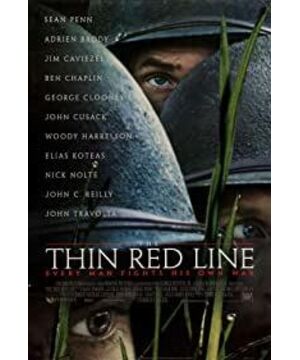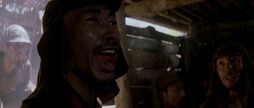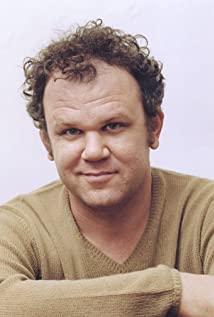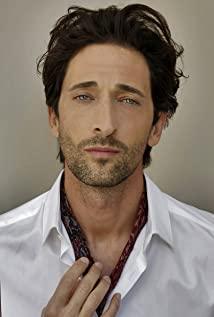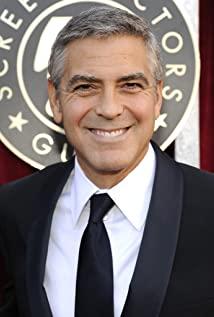Many insightful film critics firmly believe that "Fine" is one of the best films in the war theme, while more people think that most of the excellent war movies are anti-war themes. And the most thorough anti-war includes not only the war of evil, but also the war of justice, just like we should hate the war of aggression and the war of anti-aggression. I'm also a staunch anti-war fanatic, but probably not the one here. The difference here is whether heroism in war is required, or the fearlessness promoted as a positive commentary. This may come back to another question, whether the world really needs war, or that war may not be avoided. First of all, I strongly despise those wars of aggression under various banners (such as greater East Asia co-prosperity). If you want to invade, just come. Don't make excuses. For the short-term interests of your own nation, you can fight if you want. You can really win. Just as the Japanese say we Chinese, although we strongly criticize Japan's aggression against China, we sometimes feel complacent that Genghis Khan's iron cavalry hits around Moscow, which leads to another point of view. In addition to some negative lessons, there is no role in promoting the society. Social Darwinists may think so, but maybe the law of the jungle cannot be applied to a high-level social group like human beings. I have not been able to figure out the positive and negative answers. But I still think that the anti-aggression heroes are worthy of our praise, advocacy and learning. However, sometimes I also ask, is the war against aggression a just war, and are the two equal? Who judges justice and evil, the government, the people, or history? I don't know if it is true to say that the U.S. government is belligerent, but the American people are anti-war, so many governments that started war have crossed Taiwan because of the war.
About the video--
The content of the story of "Xiao" is simply clumsy in terms of traditional storytelling. I think the biggest success of the story is her fascination. For a low-level audience like me, "Fine" doesn't do that. However, although this is a humanistic philosophy film, it is not a philosophical allegory film, and in my opinion, she still has her brilliance. First of all, the big crocodile at the beginning of the film (whether philosophical or not) introduces us to the beautiful scenery of the tropical rain forest and the harmonious and happy life of the indigenous people. Although such a beautiful scenery was quickly interrupted by the war, even during the fierce battle, the background scenery was still So charming, tall trees, plants taller than a human head, fine and soft grass, as well as the beautiful outlines of the mountains and the sound of the water, all constitute a beautiful picture. People say that yellow and black are the colors with the greatest contrast, and black characters on a yellow background are the most clear and eye-catching, so the signs on the highway are all in this form. Perhaps Terrence Malick was well aware of this, so he placed some of the people and things that people least wanted to see and experience on the most beautiful background. Growing up in Chinese anti-Japanese hero movies, at first I thought it was a group of "bad" soldiers like they said they were the commander of C Company. Well, maybe a little bit down, as a soldier, just seeing their cowardice, trembling, fear, loss, and monologues that seem to contain philosophies, makes my feelings change with them, and some feel tired and vomited, which may be Exactly what director Terrence Malick wanted to convey. With the help of the company commander, another point of view is expressed. If judged by rhetoric and fearlessness, the company commander may be very weak, but as a commander, he cannot ignore the blood of his brother and die. His hesitation and weakness are right pity of life. Rushing to the end, facing the defeated Japanese soldiers who were either dead or captured, this group of American soldiers did not have the joy and pride of victory, perhaps because they saw Japanese soldiers who were even worse than them - disheveled due to hunger or fear, Unwashed, twitchy, unhinged. Is this the ending they desperately fought for?
About several years -
In terms of the total five-star rating, although I also agree with the profound and philosophical subject reflected in "Fine", I only give it a three-star rating. Except for the degree of anti-war that is difficult to discern, I don't think this film is very endearing. Some people will find it very interesting. I just feel a little disgusted in my heart and want to end it quickly. Or the cruelty and destruction of war. Well, maybe people who like horror movies will appreciate the beauty of it. Although the monologues of many soldiers are rich in philosophy, the plot of the film cannot interpret such humanitarian principles well. For example, "Dancing with Wolves" and "Million Dollar Baby", the entire film only clarifies one truth. . Maybe these many monologues are just different expressions of a truth. I haven't read them carefully. Maybe it is. Because of the above reasons, I have no motivation to read them again, and leave them for a few years. People's taste and aesthetics change constantly with age. I remember that I never thought Mao Amin's songs, including Na Ying's songs, were good when I was a child. After a few years, I will carefully distinguish whether the anti-war is thorough or not, the taste of such a war, and the philosophical monologue. Next year, the year after, or more...
View more about The Thin Red Line reviews


